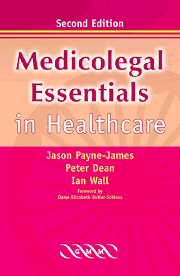Book contents
- Frontmatter
- Contents
- Contributors
- Editors' note for the first edition
- Editors' note for the second edition
- Foreword
- Table of statutes
- Table of cases
- 1 Legal institutions and the legal process
- 2 Human rights and healthcare professionals
- 3 Medical ethics and the forensic physician
- 4 Confidentiality
- 5 Consent to medical treatment
- 6 Professional bodies and discipline
- 7 Complaints in the National Health Service
- 8 The Mental Health Act (England and Wales)
- 9 Death certification and the role of the coroner
- 10 Tissues and organs
- 11 Organ donation
- 12 Living wills
- 13 Euthanasia and end-of-life decision-making
- 14 Abortion and reproductive health
- 15 The Children Act 1989
- 16 Clinical negligence
- 17 Legislation for medicines and product liability
- 18 Clinical trials: ethical, legal and practical considerations
- 19 Medicolegal implications of blood-borne viruses
- 20 Healthcare professionals in court – professional and expert witnesses
- Index
19 - Medicolegal implications of blood-borne viruses
Published online by Cambridge University Press: 12 January 2010
- Frontmatter
- Contents
- Contributors
- Editors' note for the first edition
- Editors' note for the second edition
- Foreword
- Table of statutes
- Table of cases
- 1 Legal institutions and the legal process
- 2 Human rights and healthcare professionals
- 3 Medical ethics and the forensic physician
- 4 Confidentiality
- 5 Consent to medical treatment
- 6 Professional bodies and discipline
- 7 Complaints in the National Health Service
- 8 The Mental Health Act (England and Wales)
- 9 Death certification and the role of the coroner
- 10 Tissues and organs
- 11 Organ donation
- 12 Living wills
- 13 Euthanasia and end-of-life decision-making
- 14 Abortion and reproductive health
- 15 The Children Act 1989
- 16 Clinical negligence
- 17 Legislation for medicines and product liability
- 18 Clinical trials: ethical, legal and practical considerations
- 19 Medicolegal implications of blood-borne viruses
- 20 Healthcare professionals in court – professional and expert witnesses
- Index
Summary
INTRODUCTION
Medical conditions may have direct medicolegal implications. This chapter explains in detail the background to blood-borne viruses in terms of incidences and impact from a medicolegal perspective. The serendipitous discovery, by Blumberg 1965, of the so-called Australia antigen (now known as hepatitis B surface antigen) and its association with serum hepatitis heralded the dawn of a new era – the recognition that blood and/or other body fluids can transmit infection. Since then there has been an increased awareness amongst healthcare professionals and lay people alike about infections from other blood-borne viruses (BBVs) – Hepatitis D Virus (HDV), the Human Immunodeficiency Virus (HIV) and Hepatitis C Virus (HCV) – and their potentially fatal complications. Doctors have a duty of care to their patients, to educate and wherever possible treat such infections. They also need to prevent the spread of infection by protecting others who might be placed at risk. In some situations issues of consent and confidentiality may arise leading to ethical dilemmas.
In 1889 the Infectious Disease (Notification) Act was introduced in England and Wales to identify and prevent the spread of infectious diseases. Over time certain diseases were eradicated and others were added. The Public Health (Control of Diseases) Act 1984 requires the statutory notification of cholera, plague, relapsing fever, small pox, typhus and food poisoning.
- Type
- Chapter
- Information
- Medicolegal Essentials in Healthcare , pp. 203 - 232Publisher: Cambridge University PressPrint publication year: 2004



